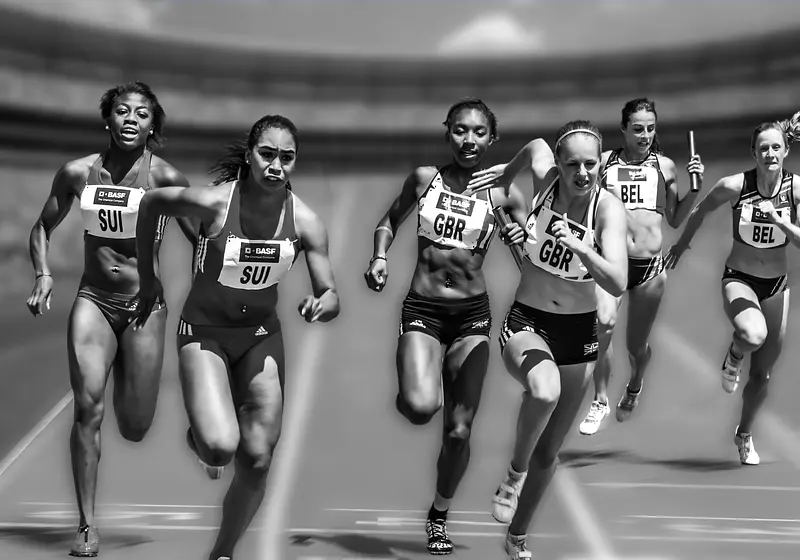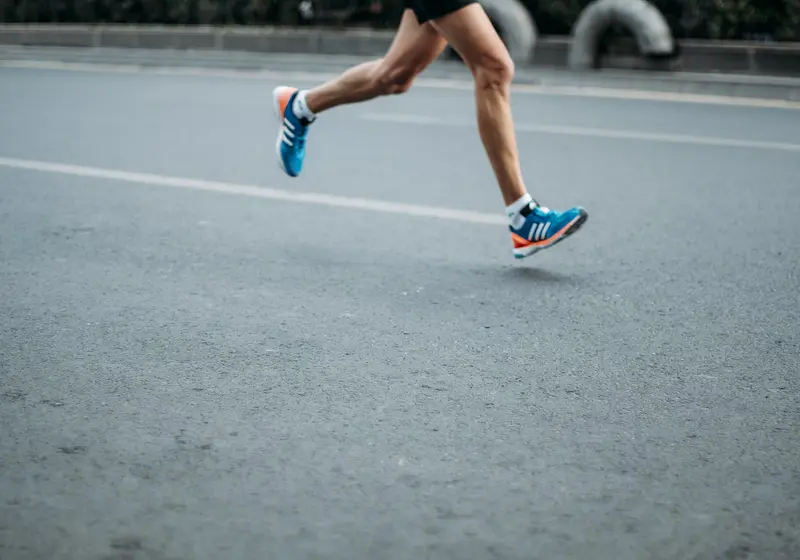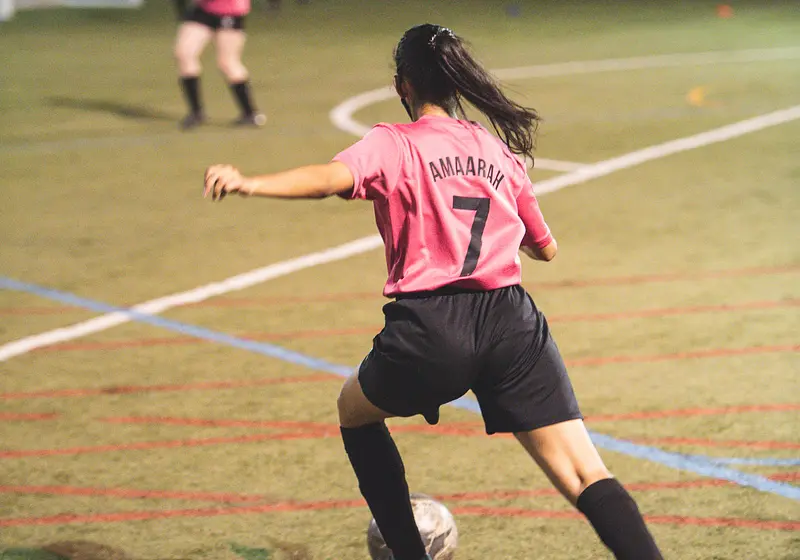Trigger warning: Body image, body dysmorphia, eating disorders and SA.
When I was growing up, I loved to play sports. I was such a fidgeter and needed to be moving all the time, so it was natural that I signed up for any sport, class or workshop possible. I remember starting gymnastics at age four, taking classes at school and doing it outside of school for fun.
By age six, I’d started dancing and running, and by the end of primary school, I was on the football team, basketball team and athletics team. I think children partaking in sports is so important, regardless of any contextual circumstances - it instils confidence and self-love, invites cooperation and teamwork, and breeds perseverance, discipline and consistency. Engaging in physical activity made me a better child.
A group of young friends running together.
But it wasn’t at all without its challenges. I always wanted to try shooting a hoop in the playground as a seven-year-old, yet kept being rejected because I was a girl. So, I went home and asked my mum to buy me a basketball so I could practice shooting in the park.
In a few weeks, I could see my improvements. And the boys at school could too. So much so that some of the girls at school started (on occasion) to play with me.
Being my stubborn self, I just wanted to prove a point. But as I grew, I got to understand the current and past beliefs around women in sports.
Little girls playing football.
Let us slide into your dms 🥰
Get notified of top trending articles like this one every week! (we won't spam you)The History
When discussing the timeline of women in sport, one can find that there are many contrasting attitudes - whilst some are reflective of an egalitarian world, others perpetuate gender-based stereotypes. Traditionally, sport was dominated by men: married women couldn’t attend the Ancient Olympics (under threat of death) and although maidens could attend, they couldn’t compete. Having said that, one must also note that in Ancient Greece, women could partake in festivals where they played ball games with each other; carvings on walls, tombstones and other historical relics of Ancient Egyptian society depict women partaking in swimming; and Spartan women could wrestle, race and horse-ride (see here for more). Prior to my own research and findings, I had a preconceived notion surrounding the treatment and perception of women in the ancient world, and I’m pleased to at least some degree, I am proven wrong.
In Ancient Rome, men would compete in the Colosseum as gladiators.
However, stereotypes surrounding women and their engagement in physical activity became more prevalent in Victorian society: initially, it was seen that women who played sports were uncouth and wouldn’t make appropriate, submissive and refined wives (which naturally would have hindered females from engaging in physical activity - marriage was a cornerstone of Victorian society with the nuclear family being a fundamental institution which couldn’t be abolished or allowed to collapse as seen through the Conservative ideology). Even with the evolution of women being allowed to play sports eventually, there were certain sports they could play, and the consensus was that competitive sports were unladylike.
Men thought that the fair compromise would be allowing women to engage in physical activity if it was in a manner that was dignified, woman-like and graceful.
In some circumstances, women had to be supervised by men. This all in all reflects that as recently as 150 years ago, there were barriers to women enjoying themselves without being constrained by male standards.
A Victorian housewife, sipping her tea in a "womanly" fashion.
Take the Quiz: Which Indian city is the perfect holiday spot for you!?
Let's match you with an Indian city that you would love!
The Present
Society has since evolved and we’ve seen the first intercollegiate basketball match between Stanford University and the University of California in 1896, the first women’s FIFA World Cup in 1991 and the Lionesses win the Euro 2022 competition. A timeline of women in sports can be seen here. I think it's beautiful to see other women thrive in a field that for so long we were shielded from.
But this society brings a different problem. And it’s rooted in social stereotypes.
In my secondary school, we were all required to take practical and theoretical PE and I remember vividly in a theory lesson, we leant about BMI and were taught about endomorphs, ectomorphs and mesomorphs and my teacher gave us a list of sports that each body type would be good at. At the time I didn’t think much of it. Looking back, I wonder what detriments these left on my classmates.
At the time, everyone was jokingly labelling each other each of the body types. Being told what sports you were better off playing rather than encouraging children to try everything and find out. Feeling uncomfortable in your own skin.
Being discouraged to even try. People cease to understand the gravity of the weight and self-image discussion and this is extremely damaging to our children. Research from The British Journal of Nursing suggests that 1-2% of teens suffer from body dysmorphia and in the UK, children being admitted to hospital with eating disorders increased by 35% between 2021 and 2022.
We're stuck constantly weighing. Constantly measuring. Constantly staring.
These statistics are frightening and unfortunately, it's the product of social media and unreasonable social pressures for children to look a certain way instead of celebrating the differences and diversities that our bodies have.
Our bodies are different. And every single one is beautiful.
And subconsciously, this impacted me too. I felt uncomfortable in my own skin. Sports became a spectacle.
An activity where I’d just be made a spectacle of. When I started secondary school, I tried out for a lot of team sports that I’d done as a child. When team lists would come out, I’d analyse the lists of the successful candidates (specifically the girls) and try to work out what they had that I didn’t. And I thought it was weight.
I look back at my pictures from the time and realise it wasn’t, but I’m not upset at myself for thinking so. In a lot of sports that I played, I hardly ever saw a woman who resembled me: curvaceous with large breasts and when engulfed in a world of beauty standards and social norms, it’s very easy to become trapped in this cycle.
What scares me is if women are subjected to a horrible fate whether being taken advantage of losing sight of themselves. We live in an era engulfed by social conventions that are so detrimental to the way they perceive themselves; so much so that they give up altogether and it’s time we changed. I don’t want future generations of young people to grow up in a world that gives them a warped view of themselves.
There are many sports exclusively crafted for women - netball (my favourite sport), synchronised swimming, and figure skating. I think it’s important to introduce women to safe spaces where they can be introduced to the importance of physical activity. But more than this, present women playing typically “male” sports to demonstrate that women can do all that they wish.
Women's basketball.
What we need.
It’s not only crucial to encourage women to play sports the way we cheer on our boys, but also to protect our women from abuse when playing said sports. Break down barriers preventing our women from trying something new. Increase representation of various body types, people with varying abilities, and people of different backgrounds.
Present the diverse lenses through which people can experience life and sports. Prevent our women from being disrespected, used and abused. It scares me when I read the testimonies of athletes like Simone Biles and Aly Raisman who suffered abuse in their careers: women doing what we love and we are still at risk.
And the cure for this is twofold: firstly, we teach against these actions and reinforce that it has no place in our society; and secondly, encourage people to speak out whether they are witnesses or victims.
Sports can serve as a safe haven, a chance to express ourselves. It was my way of being my best self and bringing out the best in others. It was how I learnt discipline.
It was how I found myself when I was lost. And whether it's gender or sexuality, ethnicity or disability, people should always be able to feel this. A home.
A team.















